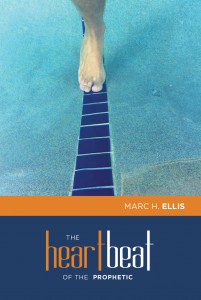The “Jewish Civil War”, “Empire Judaism”, “Jews of Conscience”, the “End of Jewish History”.
Is this the vocabulary of a scholarly Jewish theologian or a lot of overblown rhetoric from a semi-retired professor of Jewish studies who’s lost the plot?
Are Jews across the world really tearing their communities apart over the question of Israel’s behaviour towards the Palestinians? Are things so bad that we face the demise of Judaism as we know it and the abandonment of the community by a disaffected generation fed up with the hypocrisy of it all?
There was a time when Marc H. Ellis was in favour with at least some parts of the Jewish religious and cultural establishment. I can tell by the fact that quotes from his writings can be found anthologised in the study sections of my prayers books.
But I doubt Ellis gets quite so many copyright requests these days. His views have become too hot to handle.
Last year when I approached a respected UK Jewish journal offering an interview I’d conducted with Ellis I had this response from the editor.
“I’m deeply concerned about what Marc Ellis has to say. I have read his work in the past and seen him speak. I found his work useful and provocative. I think though, from the evidence of the interview, he has ‘jumped the shark’….we don’t like to publish rants and polemics and his words do appear to be that, they certainly lack the elegance of his earlier writing.”
Ouch!
I had to Google ‘Jump the shark’. It’s a reference to long running TV shows where far fetched claims and plots are required for the sake of novelty, usually indicating a decline in quality.
Double ouch.
‘Heartbeat of the Prophetic’ goes a long way to explaining why Ellis has fallen out of favour even within the liberal Jewish elite that once championed him following the publication of ‘Towards a Jewish Theology of Liberation’ nearly 30 years ago.
That book was built on his experience of working alongside Catholic adherents of liberation theology in the Latin America of the 1970s. Once Ellis could see how this world view should be applied to Judaism, in the post Holocaust world where Jews were finally empowered, he found his prophetic voice. It’s a voice that eventually lost him his teaching post at Baylor University. For those paying attention, the direction of travel for Ellis has been clear for some time. His theological/political/identity prognosis for the Jewish people has not been good for many years.
The online ‘Rabbi in Residence’
The Heartbeat of the Prophetic
‘Heartbeat’ is the first of a multi-volume project that will gather together his almost daily writings for the Mondoweiss website where since 2012 he has become its virtual ‘Rabbi in Residence’. Mondoweiss is the home for a growing band of Jews commentating on and chronicling the moral and political bankruptcy of the mainstream Jewish establishment when it comes to Israel/Palestine.
The challenge of switching from book length works with academic rigour to daily reportage has not been straightforward, as Ellis is the first to admit. Since these writings first appeared online Ellis has learnt the knack of keeping a tight focus and writing standalone pieces usually linked clearly to the daily news agenda. His Mondoweiss posts during the summer 2014 Gaza War have already been published as ‘Burning Children’. They are as direct and forthright as you could hope for and tightly locked into the unfolding horror of Operation Protective Edge. His record of those weeks is an instant theological reckoning that will stand the test of time and ought to be a set text in rabbinic seminaries. It won’t be though. The heat they give off is just too fierce.
In this new collection his early limitations as a blogger turn out to be a virtue. Breaking all the standard blogging rules is what makes ‘Heartbeat’ such a worthwhile read. Thoughts, images and word play flow from one post to the next as Ellis contemplates his new post academia surroundings in Florida, walks along the beach front, reads and applies to his thinking a wide range of political and cultural biographies, and explores the ever deepening Jewish malaise.
His talent for provocative word and image associations which illuminate how faith, identity and power politics have become so hopelessly tangled up is on full display. So welcome to beach front walks where muzuzahs become symbols of intimidation to the “Jew of Conscience” and to apocalyptic daydreams where you draw back the velvet curtains of the Synagogue Ark to find, not Hebrew scrolls, but helicopter gunships emblazoned with the Star of David.
It’s unsettling. But that’s the point.
A journey into exile
In book form these collected posts turn out to be an intense journey into what it means to be a ‘Jew in exile’, an exile both forced upon Ellis and one which he has freely entered into. He’s in no doubt why he has found himself pushed to the margins.
“Imperialism has penetrated so deeply into the core of what it means to be Jewish that calling it out provokes an intense reaction.”
For Ellis the prophetic tradition of speaking truth to power, that first burst through in the fiery and fearless indignation of Hebrew scripture, remains what he calls “the Jewish indigenous”. Strip away all the arguments over what makes an ‘authentic Jew’ (culture, religious observance, loyalty to Israel?) and you are left with Judaism’s prophetic disposition, the compulsion to call out iniquity and injustice whatever the personal or communal consequences.
What’s interesting as you read ‘Heartbeat’, is working out if Ellis himself has become more extreme in his prophetic critique, as my UK Jewish Editor insisted, or if he is simply responding to the ever worsening situation in Israel/Palestine.
“The Palestinians reach bottom after bottom, until a cardinal belief emerges…that there is no bottom that cannot be broken through. Downward.”
For those Jews that can no longer stomach what has happened in the long shadow cast by the Holocaust and in the name of Jewish security, the picture is bleak.
“Think of Jews of Conscience as scavengers after the Jewish ethical tradition has been scorched beyond recognition. That’s where we start. If we are honest.”
It’s easy to see why Ellis is not everyone’s cup of tea. He’s certainly a modern day Jewish iconoclast, smashing idols in true Abrahamic tradition. That sometimes means taking aim at those who are considered ‘the good guys’ by most Jews on the dovish, anti-occupation, anti-settlement spectrum of Jewish opinion.
He says of Rabbi Michael Lerner of Tikkun magazine, “Lerner’s sword is dull. He hasn’t slain anything, just carved out a place in the windmills of his own self-appointed (rabbinic) universe.”
This may taste like so many sour grapes but when combined with Ellis’ criticism of Rabbis for Human Rights, it becomes clear why he has such little patience with what he describes as the “left wing of Jewish Empire”.
“Progressive Jews” such a Lerner, Arthur Waskow and the late Rabbi David Forman, all fail the Ellis test of prophetic integrity. They want to uphold Jewish ethical virtues but are unwilling to follow the prophetic to the uncomfortable places it leads you to.
For Ellis, the Jewish “Progressives” duck the the difficult questions. Was Zionism flawed from the very beginning? Was Israel born in sin? Have we liberated ourselves at the expense of another people whose needs we must now forever suppress? Ellis sees Lerner and Forman as too concerned with maintaining a privileged Jewish ethical position that in the end just tempers the worst excesses of “Empire Judaism”.
No route map to redemption
So what does the “Jew of Conscience” do who is not prepared to sell out to the power elites, or rationalise the oppression of another people, or play the Holocaust card to protect against criticism of Israel? Is the “Jew of Conscience” left with nothing to do but chronicle the destruction and howl into the wind?
Ellis recounts a trip to the West Bank with his son Aaron that displays a generational gap in possible responses:
“…Aaron and I stood at the Apartheid Wall. With my arm around his shoulder, I said to him This is the end of Jewish history. He replied – it’s unjust Dad, wrong. We have to bring the Wall down… Generational difference. I carry so much Holocaust/Israel baggage. Baggage surrounded by mourning. Aaron doesn’t have any time for that. Let’s get on with the task in hand.”
But getting on with the task in hand is never straight forward. We learn about the encounters Ellis has had with the anti-Semitism he has found in the Boycott Divestment Sanctions (BDS) movement in Scotland, Ireland and continental Europe. It’s another response that “tangles me up in blue”. It’s not an excuse to give up though: “A few do not make the whole…it does not give Jews a reason to retreat”.
Readers of Marc Ellis shouldn’t expect too much comfort. Don’t expect a manifesto for action. And certainly not a route map to redemption.
When he writes about the “end of Jewish history” Ellis means the end of the ethical framework we have known and inherited. Jewish history will continue of course “but in a way that Jews of Conscience cannot embrace”. We are left with rubble. There is no clear future. Lamentations will come next.
It’s not surprising that Ellis has so few Jewish takers if this is all that’s on offer. But since when was hope eternal and a happy ending the prerequisite for a challenging analysis?
Reading Ellis, it’s impossible not to draw comparisons with the Hebrew Prophets of old. They too were disregarded in their own day, and their Godly inspiration critique dismissed as so much polemical ranting and raving. Too hot to handle.
Jumping the shark?
So has Ellis “jumped the shark”? Is “Empire Judaism”, the “Jewish Civil War”, “Jews of Conscience” just the fantasy creation of an academic whose career is burning out?
It doesn’t look that way to me.
The Occupation of the West Bank is approaching 50 years. It’s not temporary, it’s permanent. A peace process worthy of the name is nowhere in sight. The two state solution was killed off long ago by the Settlements. Israel, by virtue of the Occupation, is a failing democracy. After three Gaza Wars in five years it’s clear that there is no bottom to Palestinian suffering. Meanwhile, in the Jewish diaspora, Zionism is embedded in Synagogue life and liturgy, our leaders ape the hardliners that dominate the Israeli Knesset and a growing number of younger Jews see Boycotts as a rational and ethical response.
Under the circumstances, why would any reasonable observer think that Ellis is over the top in identifying that Jews and Judaism itself are facing a crisis? Not taking Ellis seriously is what starts to look irresponsible, assuming you care about the Jewish future.
The long term significance of Ellis’ work is difficult to judge but you can draw a fairly straight line from Towards a Jewish Theology of Liberation, and his subsequent writings,to the emergence of organisations like Jewish Voice for Peace and the popularity of Mondoweiss itself. The prophetic heartbeat is growing stronger and those that hear it are unwilling to walk with Ellis into ‘exile’ without putting up a fight first. Ellis deserves some credit for that. But don’t expect the patient to make a full recovery anytime soon.
‘Heartbeat of the Prophetic’ is published by New Diaspora Books. You can also purchase it through Amazon UK or Amazon USA
Read my new interview with Marc Ellis here.

















